新概念英语第一册时态总结
新概念英语(一)的几种时态
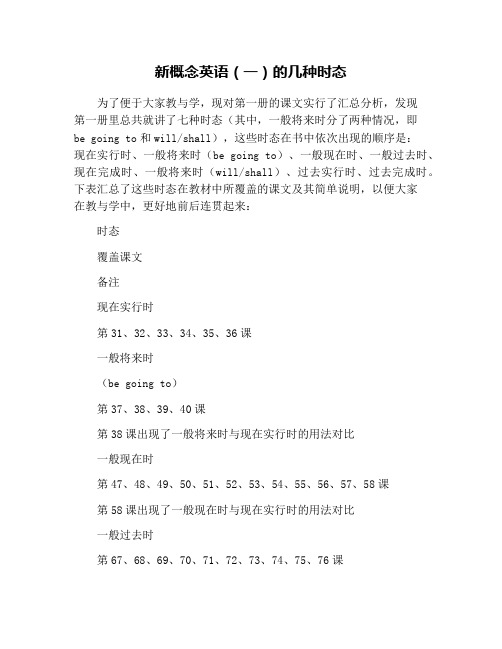
新概念英语(一)的几种时态
为了便于大家教与学,现对第一册的课文实行了汇总分析,发现
第一册里总共就讲了七种时态(其中,一般将来时分了两种情况,即
be going to和will/shall),这些时态在书中依次出现的顺序是:
现在实行时、一般将来时(be going to)、一般现在时、一般过去时、现在完成时、一般将来时(will/shall)、过去实行时、过去完成时。
下表汇总了这些时态在教材中所覆盖的课文及其简单说明,以便大家
在教与学中,更好地前后连贯起来:
时态
覆盖课文
备注
现在实行时
第31、32、33、34、35、36课
一般将来时
(be going to)
第37、38、39、40课
第38课出现了一般将来时与现在实行时的用法对比
一般现在时
第47、48、49、50、51、52、53、54、55、56、57、58课
第58课出现了一般现在时与现在实行时的用法对比
一般过去时
第67、68、69、70、71、72、73、74、75、76课
现在完成时
第83、84、85、86、87、88、89、90课
一般将来时(will)
第91、92、93、94、95、96课
第94、96课出现了一般将来时与一般过去时的用法对比
过去实行时
第117、118课
过去完成时
第119、120课
当然,英语动词的时态是无处不在的,上表仅仅反映了第一册里直接讲练时态的课文,在实际的教与学中,对于这些课文的学习,其语法重点需要放在这些时态上。
《新概念英语》第一册就讲了这么几种时态
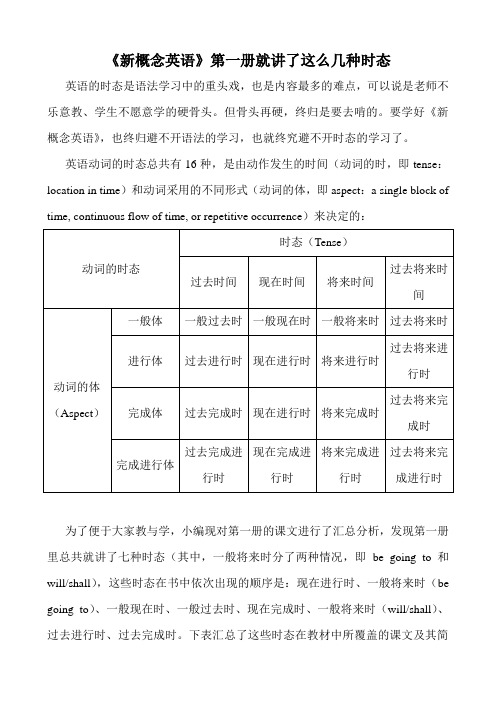
《新概念英语》第一册就讲了这么几种时态英语的时态是语法学习中的重头戏,也是内容最多的难点,可以说是老师不乐意教、学生不愿意学的硬骨头。
但骨头再硬,终归是要去啃的。
要学好《新概念英语》,也终归避不开语法的学习,也就终究避不开时态的学习了。
英语动词的时态总共有16种,是由动作发生的时间(动词的时,即tense:location in time)和动词采用的不同形式(动词的体,即aspect:a single block of time, continuous flow of time, or repetitive occurrence)来决定的:为了便于大家教与学,小编现对第一册的课文进行了汇总分析,发现第一册里总共就讲了七种时态(其中,一般将来时分了两种情况,即be going to和will/shall),这些时态在书中依次出现的顺序是:现在进行时、一般将来时(be going to)、一般现在时、一般过去时、现在完成时、一般将来时(will/shall)、过去进行时、过去完成时。
下表汇总了这些时态在教材中所覆盖的课文及其简单说明,以便大家在教与学中,更好地前后连贯起来:当然,英语动词的时态是无处不在的,上表只是反映了第一册里直接讲练时态的课文,在实际的教与学中,对于这些课文的学习,其语法重点需要放在这些时态上。
当然,一篇课文的学习不仅仅也不应该仅限于语法的学习;每一篇课文都有其语用学习目的。
比如说,同样是有关一般过去时的语法学习,从语用角度来看,第67和68课偏重的是如何描述过去的时间,而第73和74课偏重的是如何问路及其回答。
再比如说,同样是有关一般现在时的语法学习,第47和48课偏重的是个人喜好的表达,而第51和52课偏重的是天气和气候的表达。
本文跟大家分享的是第一册里出现的各种时态,但在实际的教与学中,会有各种方法去处理时态,接下来小编会跟大家做更多这方面的分享,敬请关注。
新概念英语第一册时态总结+练习
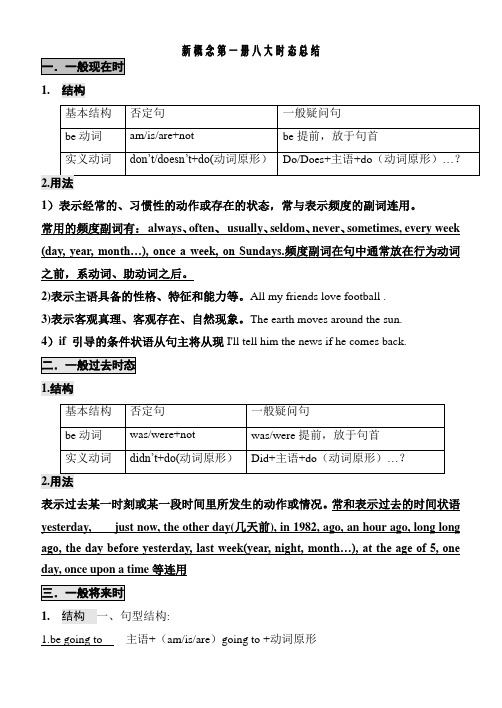
新概念第一册八大时态总结一.一般现在时1.结构基本结构否定句一般疑问句be动词am/is/are+not be提前,放于句首实义动词don’t/doesn’t+do(动词原形)Do/Does+主语+do(动词原形)…?2.用法1)表示经常的、习惯性的动作或存在的状态,常与表示频度的副词连用。
常用的频度副词有:always、often、usually、seldom、never、sometimes, every week (day, year, month…), once a week, on Sundays.频度副词在句中通常放在行为动词之前,系动词、助动词之后。
2)表示主语具备的性格、特征和能力等。
All my friends love football .3)表示客观真理、客观存在、自然现象。
The earth moves around the sun.4)if 引导的条件状语从句主将从现I'll tell him the news if he comes back.二.一般过去时态1.结构基本结构否定句一般疑问句be动词was/were+not was/were提前,放于句首实义动词didn’t+do(动词原形)Did+主语+do(动词原形)…?2.用法表示过去某一时刻或某一段时间里所发生的动作或情况。
常和表示过去的时间状语yesterday, just now, the other day(几天前), in 1982, ago, an hour ago, long long ago, the day before yesterday, last week(year, night, month…), at the age of 5, one day, once upon a time等连用三.一般将来时1.结构一、句型结构:1.be going to 主语+(am/is/are)going to +动词原形2.will :主语+will+动词原形(will为助动词,与情态动词用法相同,与动词原形构成谓语,不需要根据人称进行变化。
新概念英语第一册的七大时态
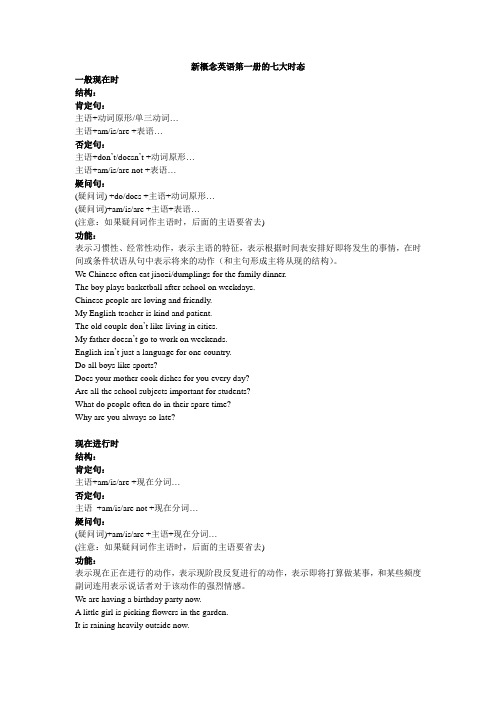
新概念英语第一册的七大时态一般现在时结构:肯定句:主语+动词原形/单三动词…主语+am/is/are +表语…否定句:主语+don’t/doesn’t +动词原形…主语+am/is/are not +表语…疑问句:(疑问词) +do/does +主语+动词原形…(疑问词)+am/is/are +主语+表语…(注意:如果疑问词作主语时,后面的主语要省去)功能:表示习惯性、经常性动作,表示主语的特征,表示根据时间表安排好即将发生的事情,在时间或条件状语从句中表示将来的动作(和主句形成主将从现的结构)。
We Chinese often eat jiaozi/dumplings for the family dinner.The boy plays basketball after school on weekdays.Chinese people are loving and friendly.My English teacher is kind and patient.The old couple don’t like living in cities.My father doesn’t go to work on weekends.English isn’t just a language for one country.Do all boys like sports?Does your mother cook dishes for you every day?Are all the school subjects important for students?What do people often do in their spare time?Why are you always so late?现在进行时结构:肯定句:主语+am/is/are +现在分词…否定句:主语+am/is/are not +现在分词…疑问句:(疑问词)+am/is/are +主语+现在分词…(注意:如果疑问词作主语时,后面的主语要省去)功能:表示现在正在进行的动作,表示现阶段反复进行的动作,表示即将打算做某事,和某些频度副词连用表示说话者对于该动作的强烈情感。
(完整版)新概念英语第一册知识点总结-

第一册重点语法知识点都包含:时态:一般现在时,现在进行时,现在完成时,一般过去时,过去进行时,过去完成时,一般将来时,过去将来时。
词性:动词现在分词、动词的过去式和过去分词。
形容词、副词的比较级与最高级。
助动词、情态动词、半情态动词的使用。
动词不定式。
反身代词、不定代词。
特殊疑问词。
句式:简单句、并列句、复合句(定语从句、状语从句、宾语从句)。
语态:被动语态。
结构:There be结构。
语序:倒装。
(新概念英语一册1-144课的所固定搭配短语)I beg your pardon 请您在重复(说)一遍 Nice to meet you(too)(我也)很高兴见到你Look at…看… How do you do 你好 Be careful 小心A loaf of 一个 A bar of 一条 A bottle of 一瓶 A pound of一磅 Half a pound of 半磅 A quarter of 四分之一 A tin of 一听 Hurry up 快点 Next door 隔壁 Black coffee 不加牛奶的咖啡White coffee 加牛奶的咖啡 Come home from school 放学回家Come home from work 下班回家 At the moment 此刻What‟s the time? 几点钟? Come upstairs 上楼 Come downstairs 下楼Hundreds of…数以百计的… On the way home 在回家的途中This morning 今天早晨 This afternoon 今天下午This evening 今天晚上 tonight 今天夜里Yesterday morning 昨天早晨 Yesterday afternoon 昨天下午 Yesterday evening昨天晚上 Last night 昨天夜里The day before yesterday in the morning 前天早晨The day before yesterday in the afternoon 前天下午The day before yesterday in the evening 前天晚上The night before last 前天夜间A low mark 分数很底 A high mark 分数很高 She said to herself 她心中暗想 The way to…到…的走法In fashion 流行的,时髦的I‟m afraid…我恐怕…I‟m sure…我确信,我肯定… A lot of 许多(用于肯定句)At all 丝毫、更本、一点也不 Going on holiday 度假Have been to…到过… All the time 一直,始终Have been to…到过… Drive into…撞倒…For sale 供出售、出售 Have the last word 最后决定、最后才算The R.A.F. 英国皇家空军 Return ticket 往返票Next door to…与…相邻,在…隔壁 In five hours‟time在五小时之后。
最全的新概念英语第一册语法汇总

第一册重点语法知识点都包含:时态:一般现在时,现在进行时,现在完成时,一般过去时,过去进行时,过去完成时,一般将来时,过去将来时。
词性:动词现在分词、动词的过去式和过去分词。
形容词、副词的比较级与最高级。
助动词、情态动词、半情态动词的使用。
动词不定式。
反身代词、不定代词。
特殊疑问词。
句式:简单句、并列句、复合句(定语从句、状语从句、宾语从句)。
语态:被动语态。
结构:There be结构。
语序:倒装。
(新概念英语一册1-144课的所固定搭配短语)I beg your pardon 请您在重复(说)一遍Nice to meet you(too)(我也)很高兴见到你Look at…看… How do you do你好 Be careful 小心A loaf of 一个 A bar of 一条 A bottleof 一瓶 A pound of 一磅Half a pound of 半磅 A quarter of 四分之一 A tin of 一听Hurry up 快点Next door 隔壁 Black coffee 不加牛奶的咖啡White coffee 加牛奶的咖啡 Come home from school 放学回家Come home from work 下班回家 At the moment 此刻What’s the time? 几点钟?Come upstairs 上楼 Come downstairs 下楼Hundreds of…数以百计的… On the way home在回家的途中This morning 今天早晨 This afternoon 今天下午This evening 今天晚上 tonight 今天夜里Yesterday morning 昨天早晨 Yesterday afternoon 昨天下午Yesterday evening 昨天晚上 Last night 昨天夜里The day before yesterday in the morning 前天早晨The day before yesterday in the afternoon 前天下午The day before yesterday in the evening 前天晚上The night before last 前天夜间 A low mark 分数很底 A high mark 分数很高She said to herself 她心中暗想The way to…到…的走法In fashion 流行的,时髦的I’m afraid…我恐怕…I’m sure…我确信,我肯定… A lot of许多(用于肯定句)At all 丝毫、更本、一点也不 Going on holiday 度假Have been to…到过… All the time一直,始终Have been to…到过… Drive into…撞倒…For sale 供出售、出售 Have the last word 最后决定、最后才算The R.A.F. 英国皇家空军 Return ticket 往返票Next door to…与…相邻,在…隔壁In five hours’time在五小时之后。
新概念第一册英语时态总结
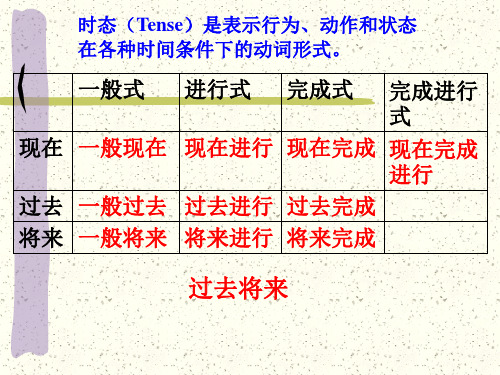
完成进行 式 现在 一般现在 现在进行 现在完成 现在完成 进行 过去 一般过去 过去进行 过去完成 将来 一般将来 将来进行 将来完成
一般式
进行式
完成式
过去将来
He loves me. He loved me. I will love him forever. I have loved him for 6 years. I told him I had loved him for 5 years last year. I will have loved him for 7 years by the end of this year. I asked him if he would love me forever.
I could have called you yesterday, A but I ____ your telephone number.(2001A) A.didn’t have B. won’t have C.hadn’t had D. wouldn’t have
I (write) am writing a book at the _________ moment. I don’t like to sit beside him, for he D _____ me silly愚蠢的 questions. A.asks B. always asked C. has asked D. is always asking
在“this is/was the first/ second/ third…… time that……”句型里要求 用现在/过去完成时。 这是我第一次演讲. This is the first time that I have given a speech.
新概念英语第一册语法总结

英语中的时态一共有八种,它们是:一般现在时、现在进行时、一般过去时、现在完成时、一般将来时、过去进行时、过去完成时、过去将来时。
今天我们所要讲的就是第一种:一般现在时——表示一般性,经常性的动作或一般性事实。
1、含有be动词的句子He is a teacher.The girl is very beautiful.Tim and Jack are students.★变疑问句将be动词移到句首Is he a teacher?Is the girl very beautiful?Are Tim and Jack students?★变否定句在be动词后面加notHe is not a teacher.The girl is not very beautiful.Tim and Jack are not students.★肯定回答及否定回答Yes, he is. / No, he is not.Yes, she is. / No, she is not.Yes, they are. / No, they are not.2、不含有be动词的句子,即含有一般动词的句子。
(1)第三人称单数及单数名词He likes books.She likes him.The dog likes bones.★变疑问句在句首加does, 动词变为原型Does he like books?Does she like him?Does the dog like bones?★变否定句在主语及动词之间加doesn't, 动词变为原型,原句中的动词不再有第三人称变化。
He doesn't like books.She doesn't like him.The dog doesn't like bones.★肯定回答及否定回答:Yes, he does. / No, he doesn't.Yes, she does. / No, she doesn'tYes, it does. / No, it doesn't.注意:第三人称单数形式一般在动词后面加S,不要和名词复数混淆,变否定句或疑问句时名词复数没有任何变化。
新概念英语第一册时态复习

• 3.一般过去时:表示发生在过去的动作或 事情。 • yesterday、last……、……ago • 构成:①主语+be(was,e动词提前。 • am →was are you→were you • I was late yesterday. • →Were you late yesterday. • 肯定回答: Yes,主语+was/were • 代词:I ,you,he,she,it,we,they.
• 5.现在完成时:构成:主语+have/has+动词过去分 词+其他。 • Have-had-had go-went-gone do-did-done • Be-was/were-been see-saw-seen • (1)表示动作发生在过去,强调已经完成了或对现 在产生影响。(产生结果) • Eg: I have had lunch. • (2)表示动作发生在过去,到现在还没有结束,一 直持续。 • Eg: I have been a teacher since 2009.(我还是)
•一般现在时的句子变化。 •①主语(非单三)+动词原形+其他。 •变一般疑问句在句首加Do。 •②主语(单三)+动词s/es+其他。 •变一般疑问句在句首加Does,动词变回原形。 •(1)Do you often get up at seven o’clock? •Does she often get up at seven o’clock? •动词单三的变化; •①一般直接加s. Play-plays •②以x , s , ch , sh , o + es. •Eg:watch-watches do-does go-goes •③以辅音字母加y结尾,把y变i+es •Empty-empties study-studies •④特殊变化: •Have-has
新概念英语(一)的几种时态
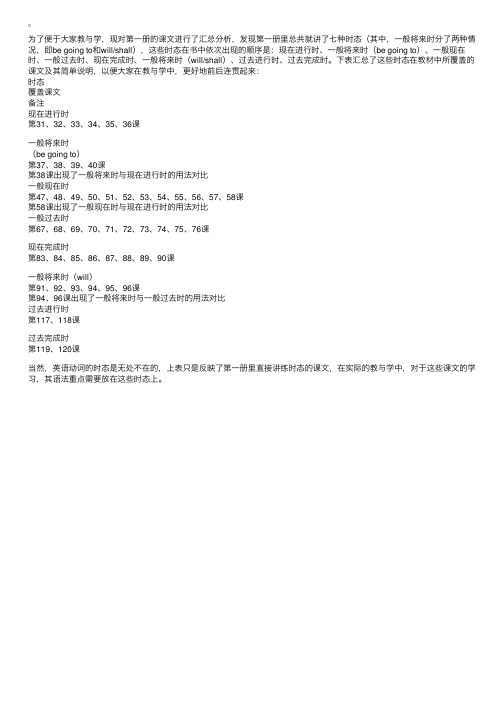
为了便于⼤家教与学,现对第⼀册的课⽂进⾏了汇总分析,发现第⼀册⾥总共就讲了七种时态(其中,⼀般将来时分了两种情况,即be going to和will/shall),这些时态在书中依次出现的顺序是:现在进⾏时、⼀般将来时(be going to)、⼀般现在时、⼀般过去时、现在完成时、⼀般将来时(will/shall)、过去进⾏时、过去完成时。
下表汇总了这些时态在教材中所覆盖的课⽂及其简单说明,以便⼤家在教与学中,更好地前后连贯起来:
时态
覆盖课⽂
备注
现在进⾏时
第31、32、33、34、35、36课
⼀般将来时
(be going to)
第37、38、39、40课
第38课出现了⼀般将来时与现在进⾏时的⽤法对⽐
⼀般现在时
第47、48、49、50、51、52、53、54、55、56、57、58课
第58课出现了⼀般现在时与现在进⾏时的⽤法对⽐
⼀般过去时
第67、68、69、70、71、72、73、74、75、76课
现在完成时
第83、84、85、86、87、88、89、90课
⼀般将来时(will)
第91、92、93、94、95、96课
第94、96课出现了⼀般将来时与⼀般过去时的⽤法对⽐
过去进⾏时
第117、118课
过去完成时
第119、120课
当然,英语动词的时态是⽆处不在的,上表只是反映了第⼀册⾥直接讲练时态的课⽂,在实际的教与学中,对于这些课⽂的学习,其语法重点需要放在这些时态上。
最全的新概念英语第一册语法汇总
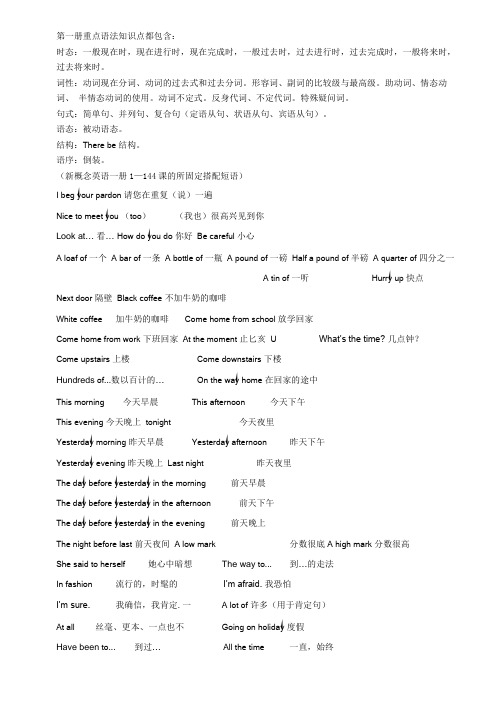
第一册重点语法知识点都包含:时态:一般现在时,现在进行时,现在完成时,一般过去时,过去进行时,过去完成时,一般将来时,过去将来时。
词性:动词现在分词、动词的过去式和过去分词。
形容词、副词的比较级与最高级。
助动词、情态动词、半情态动词的使用。
动词不定式。
反身代词、不定代词。
特殊疑问词。
句式:简单句、并列句、复合句(定语从句、状语从句、宾语从句)。
语态:被动语态。
结构:There be结构。
语序:倒装。
(新概念英语一册1—144课的所固定搭配短语)I beg your pardon 请您在重复(说)一遍Nice to meet you (too)(我也)很高兴见到你Look at… 看… How do you do 你好Be careful 小心A loaf of 一个 A bar of 一条 A bottle of 一瓶 A pound of 一磅Half a pound of 半磅 A quarter of 四分之一A tin of 一听Hurry up 快点Next door 隔壁Black coffee 不加牛奶的咖啡White coffee 加牛奶的咖啡Come home from school放学回家Come home from work 下班回家At the moment 止匕亥U What’s the time? 几点钟?Come upstairs 上楼Come downstairs 下楼Hundreds of...数以百计的…On the way home 在回家的途中This morning 今天早晨This afternoon 今天下午This evening 今天晚上tonight 今天夜里Yesterday morning 昨天早晨Yesterday afternoon 昨天下午Yesterday evening 昨天晚上Last night 昨天夜里The day before yesterday in the morning 前天早晨The day before yesterday in the afternoon 前天下午The day before yesterday in the evening 前天晚上The night before last 前天夜间 A low mark 分数很底A high mark 分数很高She said to herself 她心中暗想The way to... 到…的走法In fashion 流行的,时髦的I’m afraid. 我恐怕I’m sure.我确信,我肯定.一 A lot of 许多(用于肯定句)At all 丝毫、更本、一点也不Going on holiday 度假Have been to... 到过…All the time 一直,始终Have been to…到过…Drive into…撞倒.•・For sale 供出售、出售Have the last word 最后决定、最后才算The R.A.F. 英国皇家空军Return ticket 往返票Next door to... 与..•相邻,在..•隔壁In five hours’time在五小时之后。
最全的新概念英语第一册语法汇总

第一册重点语法知识点都包含: 时态:一般现在时,现在进行时,现在完成时,一般过去时,过去进行时,过去完成时,一般将来时,过去将来时。
词性:动词现在分词、动词的过去式和过去分词。
形容词、副词的比较级与最高级。
助动词、情态动词、 半情态动词的使用。
动词不定式。
反身代词、不定代词。
特殊疑问词。
句式:简单句、并列句、复合句(定语从句、状语从句、宾语从句)。
态:被动语态。
结构:There be 结构。
语序:倒装。
(新概念英语一册1 — 14 4课的所固定搭配短语)I beg your pard on请您在重复(说) 一遍Nice to meet you(too ) (我也)很高兴见到你Look at … 看… How do you do 你好 Be careful 小心A loaf of一个Abar of 一条A bottle of 一瓶A poundof一磅Half a pound of 半磅A quarter of四分之一 A tin of一听Hurryup 快点Next door隔壁Black coffee不加牛奶的咖啡White coffee加牛奶的咖啡 Come home from school 放学回家Come home from work 下班回家 At the mome nt此刻What' s the time?几数很高She said to herself 她心中暗想The way to … 到…的走法 In fashi on 流行的,时髦的 I ' m afraid … 我恐怕…I ' m sure …我确信,我肯定…A lot of许多(用于肯定句)At all丝毫、更本、一点也不 Going on holiday度假Have been to … 到过… All the time 一直,始终Have been to …到过… Driveinto …撞倒…点钟?Come upstairs Hundreds of … This morni ng This evening Yesterday morning Yesterday eve ning上楼 数以百计的… 今天早晨 今天晚上 昨天早晨昨天晚上Come dow nstairsOn the way home This after noon toni ghtYesterday after noon Last ni ght下楼在回家的途中 今天下午今天夜里昨天下午昨天夜里The day before yesterday in the morning 前天早晨 The day before yesterday in the after noon 前天下午 The day before yesterday in the evening 前天晚上The ni ght before last前天夜间low mark分数很底A high markFor sale 供出售、出售 Have the last word The R.A.F. 英国皇家空军Return ticket最后决定、最后才算往返票Next door to 与…相邻,在…隔壁 In five hours ' time 在五小时之后。
最全的新概念英语第一册语法汇总
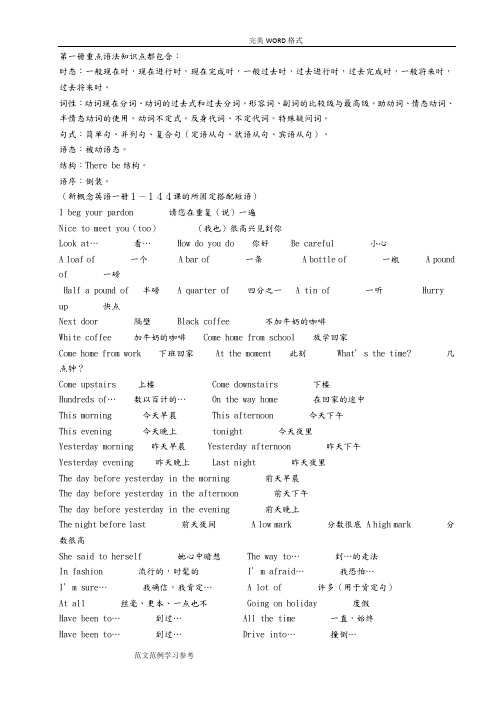
第一册重点语法知识点都包含:时态:一般现在时,现在进行时,现在完成时,一般过去时,过去进行时,过去完成时,一般将来时,过去将来时。
词性:动词现在分词、动词的过去式和过去分词。
形容词、副词的比较级与最高级。
助动词、情态动词、半情态动词的使用。
动词不定式。
反身代词、不定代词。
特殊疑问词。
句式:简单句、并列句、复合句(定语从句、状语从句、宾语从句)。
语态:被动语态。
结构:There be结构。
语序:倒装。
(新概念英语一册1-144课的所固定搭配短语)I beg your pardon 请您在重复(说)一遍Nice to meet you(too)(我也)很高兴见到你Look at…看… How do you do 你好 Be careful 小心A loaf of 一个 A bar of 一条 A bottle of 一瓶 A pound of 一磅Half a pound of 半磅 A quarter of 四分之一 A tin of 一听 Hurry up 快点Next door 隔壁 Black coffee 不加牛奶的咖啡White coffee 加牛奶的咖啡 Come home from school 放学回家Come home from work 下班回家 At the moment 此刻What’s the time?几点钟?Come upstairs 上楼 Come downstairs 下楼Hundreds of…数以百计的… On the way home 在回家的途中This morning 今天早晨 This afternoon 今天下午This evening 今天晚上 tonight 今天夜里Yesterday morning 昨天早晨 Yesterday afternoon 昨天下午Yesterday evening 昨天晚上 Last night 昨天夜里The day before yesterday in the morning 前天早晨The day before yesterday in the afternoon 前天下午The day before yesterday in the evening 前天晚上The night before last 前天夜间 A low mark 分数很底 A high mark 分数很高She said to herself 她心中暗想The way to…到…的走法In fashion 流行的,时髦的I’m afraid…我恐怕…I’m sure…我确信,我肯定… A lot of 许多(用于肯定句)At all 丝毫、更本、一点也不 Going on holiday 度假Have been to…到过… All the time 一直,始终Have been to…到过… Drive into…撞倒…For sale 供出售、出售 Have the last word 最后决定、最后才算The R.A.F. 英国皇家空军 Return ticket 往返票Next door to…与…相邻,在…隔壁In five hours’time在五小时之后。
最全的新概念英语第一册语法汇总
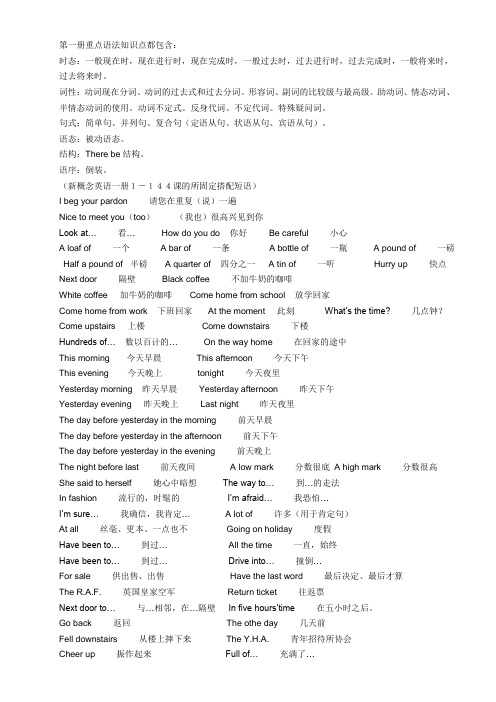
第一册重点语法知识点都包含:时态:一般现在时,现在进行时,现在完成时,一般过去时,过去进行时,过去完成时,一般将来时,过去将来时。
词性:动词现在分词、动词的过去式和过去分词。
形容词、副词的比较级与最高级。
助动词、情态动词、半情态动词的使用。
动词不定式。
反身代词、不定代词。
特殊疑问词。
句式:简单句、并列句、复合句(定语从句、状语从句、宾语从句)。
语态:被动语态。
结构:There be结构。
语序:倒装。
(新概念英语一册1-144课的所固定搭配短语)I beg your pardon 请您在重复(说)一遍Nice to meet you(too)(我也)很高兴见到你Look at…看…How do you do 你好Be careful 小心A loaf of 一个 A bar of 一条 A bottle of 一瓶 A pound of 一磅Half a pound of 半磅 A quarter of 四分之一 A tin of 一听Hurry up 快点Next door 隔壁Black coffee 不加牛奶的咖啡White coffee 加牛奶的咖啡Come home from school 放学回家Come home from work 下班回家At the moment 此刻What’s the time?几点钟?Come upstairs 上楼Come downstairs 下楼Hundreds of…数以百计的…On the way home 在回家的途中This morning 今天早晨This afternoon 今天下午This evening 今天晚上tonight 今天夜里Yesterday morning 昨天早晨Yesterday afternoon 昨天下午Yesterday evening 昨天晚上Last night 昨天夜里The day before yesterday in the morning 前天早晨The day before yesterday in the afternoon 前天下午The day before yesterday in the evening 前天晚上The night before last 前天夜间 A low mark 分数很底A high mark 分数很高She said to herself 她心中暗想The way to…到…的走法In fashion 流行的,时髦的I’m afraid…我恐怕…I’m sure…我确信,我肯定… A lot of 许多(用于肯定句)At all 丝毫、更本、一点也不Going on holiday 度假Have been to…到过…All the time 一直,始终Have been to…到过…Drive into…撞倒…For sale 供出售、出售Have the last word 最后决定、最后才算The R.A.F. 英国皇家空军Return ticket 往返票Next door to…与…相邻,在…隔壁In five hours’time在五小时之后。
新概念英语第一册第课87课讲解

新概念英语第一册第课87课讲解《新概念英语》第一册第87课是关于动词的时态的讲解。
本课主要介绍了三种基本的时态:一般现在时、一般过去时和一般将来时。
同时,本课还强调了动词形式的变化,并提供了一些例句进行说明。
以下是本课的讲解内容:1. 一般现在时:表示经常性的、习惯性的或普遍真理的动作或状态。
动词一般保持不变。
- The sun rises in the east.(太阳从东方升起。
)- I live in New York.(我住在纽约。
)2. 一般过去时:表示过去某个时间发生的动作或状态。
动词在第三人称单数后加-s,否定形式在助动词“do”后加“not”。
- He lived in London for many years.(他在伦敦生活了很多年。
)- They didn't go to the party last night.(他们昨晚没有去参加派对。
)3. 一般将来时:表示将来某个时间将要发生的动作或状态。
情态动词“will”用于肯定句中,否定句在“will”后加“not”。
- We will go shopping tomorrow.(我们明天将去购物。
)- She won't come to the meeting.(她不会来开会。
)此外,本课还介绍了其他时态的特殊形式,如现在进行时(be + 动词-ing)、过去进行时(was/were + 动词-ing)和将来进行时(will be + 动词-ing)等。
本课通过一些简单的例句,对动词时态进行了初步的讲解。
学习者需要通过大量的实践来熟练掌握不同时态的用法和动词形式的变化。
新概念一册语法总汇
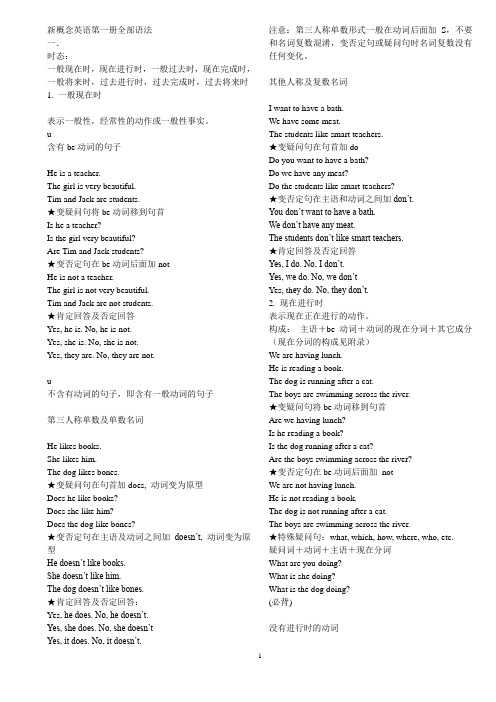
新概念英语第一册全部语法一.时态:一般现在时,现在进行时,一般过去时,现在完成时,一般将来时,过去进行时,过去完成时,过去将来时1. 一般现在时表示一般性,经常性的动作或一般性事实。
u含有be动词的句子He is a teacher.The girl is very beautiful.Tim and Jack are students.★变疑问句将be动词移到句首Is he a teacher?Is the girl very beautiful?Are Tim and Jack students?★变否定句在be动词后面加notHe is not a teacher.The girl is not very beautiful.Tim and Jack are not students.★肯定回答及否定回答Yes, he is. No, he is not.Yes, she is. No, she is not.Yes, they are. No, they are not.u不含有动词的句子,即含有一般动词的句子第三人称单数及单数名词He likes books.She likes him.The dog likes bones.★变疑问句在句首加does, 动词变为原型Does he like books?Does she like him?Does the dog like bones?★变否定句在主语及动词之间加doesn’t, 动词变为原型He doesn’t like books.She doesn’t like him.The dog doesn’t like bones.★肯定回答及否定回答:Yes, he does. No, he doesn’t.Yes, she does. No, she doesn’tYes, it does. No, it doesn’t.注意:第三人称单数形式一般在动词后面加S,不要和名词复数混淆,变否定句或疑问句时名词复数没有任何变化。
- 1、下载文档前请自行甄别文档内容的完整性,平台不提供额外的编辑、内容补充、找答案等附加服务。
- 2、"仅部分预览"的文档,不可在线预览部分如存在完整性等问题,可反馈申请退款(可完整预览的文档不适用该条件!)。
- 3、如文档侵犯您的权益,请联系客服反馈,我们会尽快为您处理(人工客服工作时间:9:00-18:30)。
新概念英语第一册时态总结Last revision date: 13 December 2020.新概念英语第一册语法总结——时态时态:一般现在时,现在进行时,一般将来时,一般过去时 / 现在完成时,过去进行时,过去完成时,过去将来时1. 一般现在时:表示一般性,常常性的动作或一般性事实。
* 含有be动词的句子 (He is a teacher.; The girl is very beautiful. ;Tim and Jack are students.)★变疑问句将be动词移到句首 (Is he a teacher; Is the girl very beautiful; Are Tim and Jack students)★变否定句在be动词后面加not (He is not a teacher.;The girl is notvery thin.;Tim and Jack are not students.)★肯定回答及否定回答 (Yes he is. No he is not.Yes she is. No she is not.Yes they are. No they are not.)* 不含be有动词的句子,即含有一般动词的句子第三人称单数及单数名词 (He likes books.;She likes him. ;The dog likes bones.)★变疑问句在句首加does 动词变为原型 (Does he like booksDoes she like himDoes the dog like bones)★变否定句在主语及动词之间加doesn’t 动词变为原型(He doesn’t like books. She doesn’t like him. The dog doesn’t like bones.)★肯定回答及否定回答Yes he does. No he doesn’t. Yes she does. No she doesn’t. Yes it does. No it doesn’t.(注意:第三人称单数形式一般在动词后面加S,不要和名词复数混淆)其他人称及复数茗词I want to have a bath.We have some meat.The students like smart teachers.★变疑问句在句首加doDo you want to have a bath Do we have any meat Do the students like smart teachers★变否定句在主语和动词之间加don’t.You don’t want to have a bath. We don’t have any meat. The students don’t like smart teachers.★肯定回答及否定回答Yes I do. No I don’t. Yes we do. No we don’t. Yes they do. No they don’t.2. 现在进行时,表示现在正在进行的动作。
构成:主语+be动词+动词的现在分词+其它成分(现在分词的构成见附录)We are having lunch.He is reading a book.The dog is running after a cat.The boys are swimming across the river.★变疑问句将be动词移到句首Are we having lunch Is he reading a book Is the dog running after a cat Are the boys swimming across the river★变否定句在be动词后面加 notWe are not having lunch. He is not reading a book.The dog is not running after a cat. The boys are swimming across the river.* 特别疑问句:what / which/ how/ where/ who疑问词+动词+主语+现在分词What are you doing What is she doing What is the dog doing* 没有进行时的动词表示状态,思想,感情和感觉的动词不能表示正在进行的动作表示感觉、感官的词see、hear、like、love 、wanthave/ has 当”拥有”讲时,没有进行时3.一般将来时表示将来将要发生的动作,常常和tomorrow、 next year 、the day after tomorrow 、the year after the next 、in five hours’ time etc. 表示将来的词联用* 结构:主语助动词will 动词原形I will go to America tomorrow.The pilot will fly to Japan the month after the next.Jack will move into his new house tomorrow morning.★变疑问句将助动词移到句首Will you go to America tomorrowWill the pilot fly to Japan the month after the nextWill Jack move into his new house tomorrow morning★变否定句在助动词后面加notI will not go to America tomorrow.The pilot will not fly to Japan the month after the next.Jack will not move into his new house tomorrow morning★肯定回答及否定回答Yes I will. No I will not. Yes he/she will. No he/she will not. Yes he will. No he will not.* 特别疑问句: What will you do* Be going to do 表示打算,预备,计划做某事结构:主语 be动词 going to 动词原型I am going to make a bookcase.They are going to paint it.The father is going to give the bookcase to his daughter.★变疑问句将be动词移到句首Are you going to make a bookcase Are they going to paint itIs the father going to give the bookcase to his daughter★变否定句在be动词后面加notI am not going to make a bookcase.They are going to paint it.The father is not going to give the bookcase to his daughter.★肯定回答及否定回答Yes I am. No I am not. Yes they are. No they are not. Yes he is. No he is not.* 特别疑问句What are you going to do?What are they going to doWhat is the father going to do?4.一般过去时表示过去发生的动作或事件,常和表示过去的时间状语连用,如yesterday、 last night 、the day before yesterday、 3 days ago* 含有be动词的句子,将动词变为过去式,(am is的过去式为was,are的过去式为were)I was at the butcher’s.You were a student a year ago.The teacher was very beautiful ten years ago.★变疑问句将be动词移动到句首Were you at the butcher’s?Were you a student a year ago?Was the teacher very beautiful ten years ago★变否定句在be动词后面加notI was not at the butcher’s. You were not a student a year ago.The teacher was not very beautiful ten years ago.★肯定回答否定回答Yes I was. No I was not. Yes you were. No you were not. Yes he/she was. No he/she was not.* 特别疑问句:What did you do不含有be动词的句子,将动词变为过去式,动词过去式构成见附录I finished my homework yesterday.The boy went to a restaurant.The Sawyers lived at King Streeta year ago.★变疑问句在句首加did,动词变为原型Did you finish your homework yesterday?Did the boy go to a restaurantDid the Sawyers live at King Streeta year ago?★变否定句在主语和动词之间加did notI did not finish my homework yesterday.The boy did not go to a restaurant.The Sawyers did not live at King Streeta year ago.★肯定回答及否定回答Yes I did. No I didn’t./ Yes he did. No he didn’t. /Yes they did. No they did not.5、现在完成时构成主语助动词have has 过去分词* 表示过去发生的和现在有某种联系的动作,常和just 、usually、 already、since等时间副词连用I have just had lunch. (饱了,不用再吃了)He has had a cup of tea.(不渴了,不用再喝)They have already had their holiday. (他们已经度过假了)The boy has already read the book. (已经知道书的内容了,不用再看了)* 询问别人是否做过某事一般用现在完成时:Have you finished your homework Have you been to Beijing Have he seenthe film* 表示开始于过去并持续到现在的动作I have lived in Beijing for twenty years.I have worked for this school for 1 year.* 表示一种经历,经验:去过…地芳,做过…事情,经历过…事情I have never had a bath.I have never seen a film.I have never been to cinema.I have ever been to Paris.★Have been to表示去过,have gone to 表示去了I have been to London.(人已经回来)He has gone to London.(人还在那里)* 表示一种结果,一般不和时间副词联用I have lost my pen.I have hurt myself.He has become a teacher.She has broken my heart.句型变化:★变疑问句将助动词移到句首,变否定句在助动词后面加not.e.g. Have you lost your pen I have not lost my pen.★肯定回答及否定回答 Yes I have. No I have not.* 特别疑问句: What have you done What has he done一般过去时与现在完成时的区别:凡是有明确的表示过去的时间状语的句子为过去时(注重:有些动词表示的动作有一个终点,不延续,因此不能和表示一段时间状语连用。
